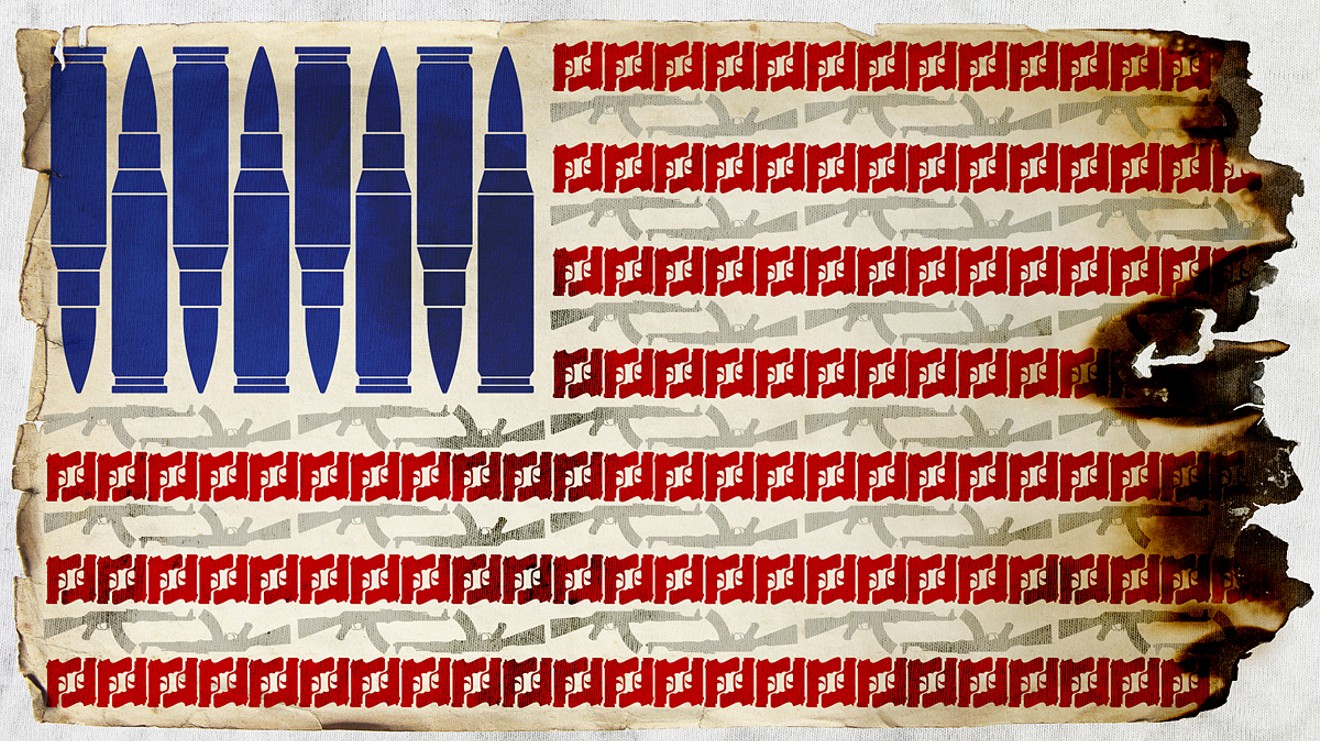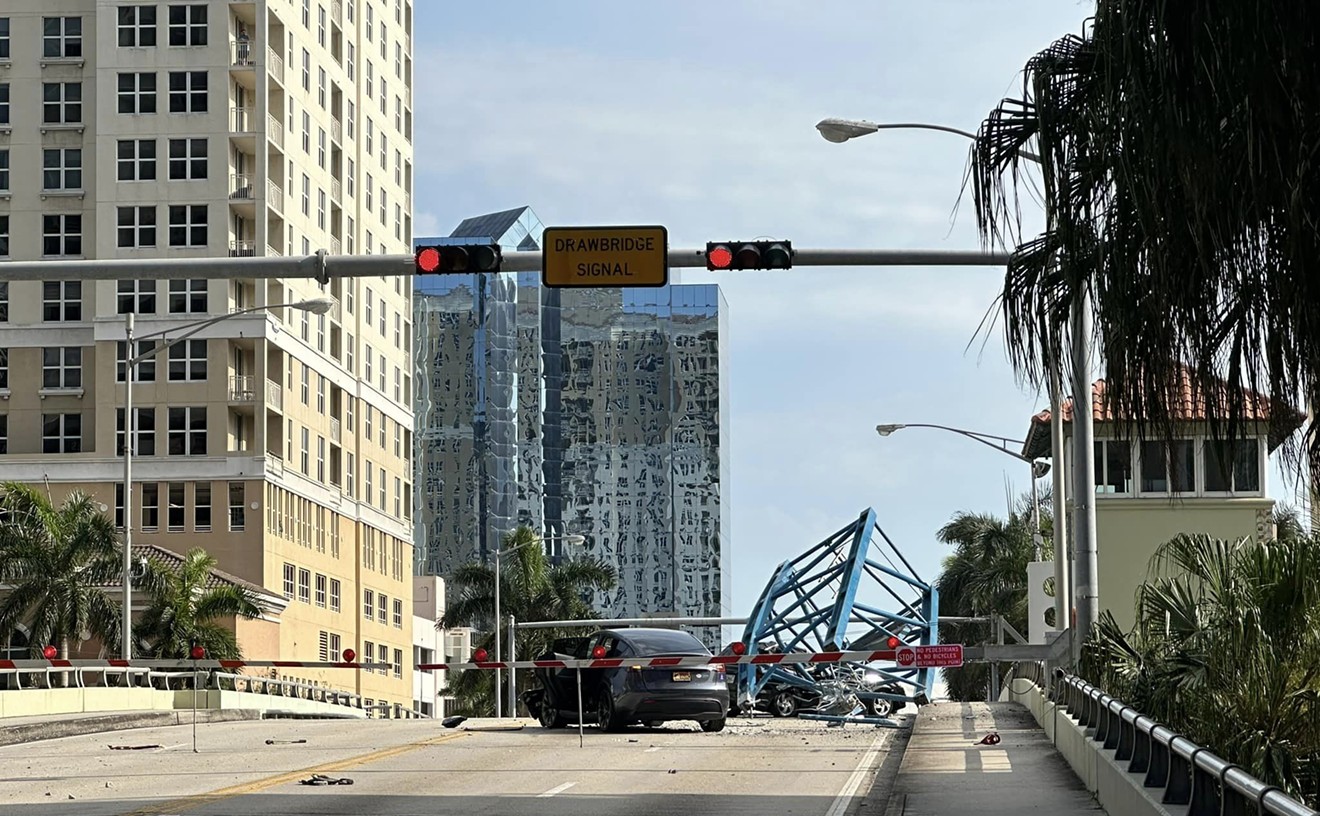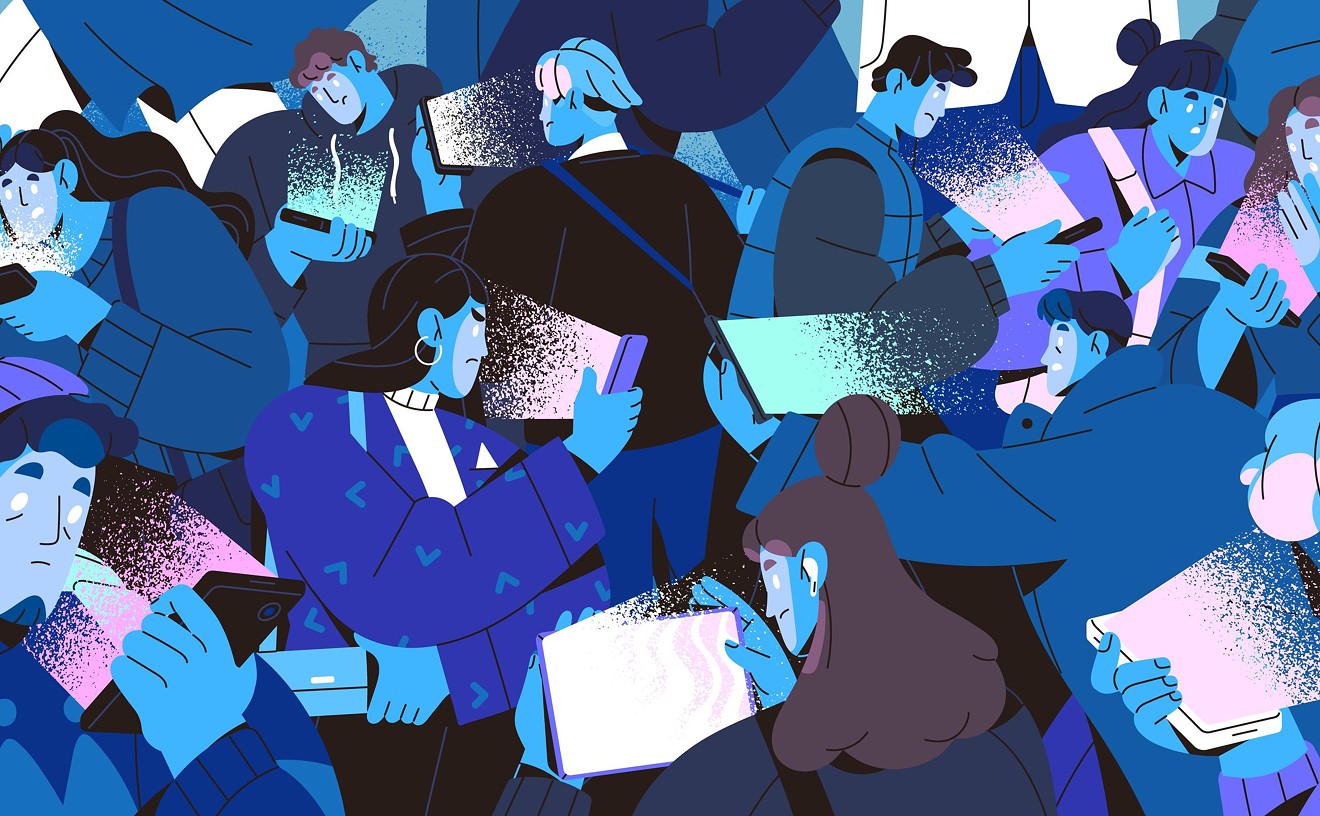Update, September 19, 2019: After the publication of this article, an attorney for Gabriel Accardi, the Navy SEAL in Coconut Creek, contacted New Times to provide more information about his case. An update has been posted at the bottom of the story.
On March 7, Lighthouse Point Police Officers Christopher Thompson and Joseph Valdes knocked on the door of a third-floor condo with a brick façade and waited for Dominic Signorile. The cops in the small coastal town in Broward County wanted to check on Signorile after someone reported seeing him clutching his face and talking to himself at the pool. Neighbors in the
The grizzled 56-year-old with hazel eyes welcomed the officers inside and told them he felt fine. But he explained he'd been having a lot of break-ins, which he blamed on the FBI and his neighbor Steven Luck, who he
"He shape-shifts, he can change heights, and I'm not sure where he comes from," Signorile said.
As he led the officers into the kitchen to show them some supposedly poisoned yogurt he'd been "saving for evidence," a pistol poked out of his cargo shorts pocket.
"Are you carrying a firearm?" one of the officers asked.
"No," Signorile said. "Why?"
Then, in the living room, the officers spotted a black handgun resting on the glass-top coffee table. They asked Signorile to step outside.
Although the cops were worried, there was little they could do about his guns. Like the vast majority of the United States, Florida law had no mechanism for taking weapons away from mentally disturbed or violent individuals.
But that was about to change. That very night, as Signorile was committed for treatment under the Baker Act, the Florida House voted in favor of the Marjory Stoneman Douglas High School Public Safety Act, which gives police a way to take guns from dangerous people. Two days later, Gov. Rick Scott signed the bill into law.
"Every legislator that voted for it should be ashamed to call themselves an American."
tweet this
It was an extraordinary victory for gun-control advocates in a state where the National Rifle Association has wielded almost unlimited power for decades. The success was fueled by an unthinkable tragedy: the Valentine's Day massacre that left 17 dead in Parkland, carried out by a disturbed teenager police had been called on dozens of times before.
Signorile was among the first targeted by the new law. Previously, his shotgun and three handguns would have been returned after his hospitalization. But now, a judge agreed with police that he shouldn't have firearms and banned him from buying or possessing guns for one year.
His case is just one illustration of why advocates say the law is desperately needed. Removing guns from someone who's a danger to themselves or others is just common sense, they say.
"We think it's manifestly in the public interest," says Kris Brown, co-president of the Brady Campaign to End Gun Violence. "Among the kinds of solutions being proposed, it is the least dramatic one can imagine."
But not everyone agrees. The conservative politicians who voted against the measure in March are already lining up to take it on in Tallahassee next year, arguing it deprives gun owners of due process. In court, some attorneys are challenging the law on constitutional grounds — and already swaying judges. Now that the visceral horror of the Stoneman Douglas shooting is fading from front-page headlines, the signature legislative result of the massacre could be in serious jeopardy in gun-friendly Florida.
"The entire premise of these orders was designed as a way to get around constitutional rights to due process that have existed since this country's founding," says Eric Friday, an attorney for the gun-rights group Florida Carry. "Every legislator that voted for it and every police department that uses it should be ashamed to call themselves an American."
To understand how the law is actually working, New Times reviewed all 108 cases filed in Broward through the end of July. Among those targeted by the petitions were 28 people accused of domestic violence, 45 people with apparent mental illness, and 34 people contemplating suicide.
Though some cases were overturned, there's little evidence of the law being used vindictively or without cause. In fact, the terrifying details of many cases — from a racist homeowner who attacked black construction workers to a man who plotted to shoot his wife at Sunday church services to a wannabe school shooter who said killing people would be "fun and addicting" — show dozens of preventable tragedies likely averted by allowing police to take guns from obviously dangerous people.
For Luck, whose heavily armed neighbor believed he was a shape-shifting monster, the law very well may have saved his life.
"He talks about how I have the ability to change my height and color — that right there should tell you the guy is sick," Luck says. "At least now for a year, everybody over in that complex is safe. Thank God he can't walk out his door and shoot us now."

After Nikolas Cruz gunned down 17 of his former fellow students and teachers at Marjory Stoneman Douglas High this past February 14, the nation cycled through its usual reactions: sadness and anger, followed by thoughts and prayers from conservatives, then outrage from liberals about the thoughts and prayers from conservatives.
But in this case, Broward Sheriff Scott Israel and antiviolence advocates argued there was a simple rule change that could have made a difference: A "red flag" law, which could have kept guns out of Cruz's hands because he had been well known to police as a threat.
"All the signs were there of someone who probably should not have had an AR-15 sitting in his home," Brown, the Brady Campaign co-president, says of Cruz.
There was a big hurdle, though: Florida hadn't passed any major new gun restrictions since
But Parkland was a game-changer. Facing pressure from the crusading teens of the #NeverAgain movement, Republican leaders in the House and Senate drafted a massive new public safety act, which added a three-day waiting period for firearms purchases and raised the legal age to buy a rifle from 18 to 21. The 105-page bill also created something called a risk protection order, a court procedure that allows judges to order dangerous people to give up their guns and to stop them from buying new ones.
"All the signs were there of someone who probably should not have had an AR-15."
tweet this
Before the Stoneman Douglas shooting, that system existed in only five states. In 1999, Connecticut was the first to enact risk protection orders after a disgruntled accountant at the state lottery shot four of his supervisors. California, Indiana, Oregon, and Washington later followed with laws of their own.
In Tallahassee, hundreds of Stoneman Douglas students pushed to add Florida to that list. During a visit February 20, they grilled House Republicans on gun control and marched outside the Capitol while chanting, "No more silence, end gun violence."
"I will fight every single day — and I know everyone here will fight for the rest of their lives — to see sensible gun laws in this country," Alfonso Calderon, a 16-year-old survivor of the shooting, said in an emotional speech to lawmakers.
Bucking the grip of the NRA, state senators passed the new gun restrictions with a narrow margin of 20 to 18. The bill received slightly more support in the House, with 67 legislators in favor and 50 opposed. Even Gov. Rick Scott, who was among 68 NRA-approved politicians to support the legislation, seemed surprised it actually passed.
"I want to point out that this is a far different way of operating than the typical inefficiency we see from the federal government in Washington," he said.
The law gave police the power to ask judges for temporary orders to take guns away from dangerous people, without any input from that person. If a judge agrees, police take the guns, and a final hearing — where the person can argue their case — is scheduled within 14 days.
Judges are given 15 criteria to determine whether a person is a danger, including whether they've made any threats toward themselves or others or committed any acts of violence, have a serious mental illness, have a past conviction for domestic violence, or have been arrested for a violent crime.
The law gave police the power to ask judges for orders to take guns from dangerous people.
tweet this
One of the first cases under the new law — brought against Zachary Cruz, the younger brother of the Parkland gunman — came before a Broward judge March 29. The Broward Sheriff's Office filed the case after the 18-year-old was arrested for trespassing on the Stoneman Douglas campus. Although Zachary didn't have any guns, investigators said the teen had a pattern of violent behavior and should not be able to buy new firearms. Chief Judge Jack Tuter agreed and banned the teen from buying or possessing any guns until at least March 2019.
Zachary Cruz's case drew heavy coverage from local reporters — but dozens of other cases filed since then under the state's red-flag law have so far drawn no scrutiny at all.

In a tiny Broward County courtroom, Kenney Fabiyi pleaded to keep his Glock. He told Judge Yael Gamm he was a responsible gun owner. He said he kept the weapon only for self-defense. He explained he had a fiercely protective spirit — so much so that at least ten people had told him he should go into law enforcement.
Dressed in a green plaid button-up shirt, the 27-year-old pulled his arms out of the sleeves and held them inside the torso of his shirt like a child trying to get warm.
"I don't wanna be a police officer because I need to make millions so I can help my community out. That is my goal, and I also want to ask you a favor as well, alongside not taking away my firearms," said Fabiyi, who'd been Baker Acted after his mother called 911 to say he was racking his gun and talking about demons. "If you can, ma'am, I need to get in touch with a rapper named Master P so he can help me on this journey to what I'm trying to do for the community."
At the hearing, Gamm listened attentively but ultimately sided with the officers. After arguments that lasted an hour and a half, she ordered Fabiyi to turn over his weapons.
"I do believe you're a good person — don't get me wrong," Gamm told him. "But I do believe
As happened with Fabiyi, Broward judges have ordered dozens of legal gun owners suffering from delusions, mental illness, or violent fantasies to give up their weapons. Erring on the side of caution, judges granted roughly three-quarters of all petitions filed through the end of July.
Although many of the cases involve mental illness, law enforcement has also successfully removed guns from people with histories of domestic violence and those threatening neighbors and relatives. At least ten petitions were filed against people with military backgrounds, law enforcement positions, or jobs that gave them regular access to guns, including two licensed security officers, a Broward Sheriff's Office court bailiff, a gun range employee, a former Navy SEAL, and a federal air marshal.
Adrian Sinclair, a 27-year-old armed security guard, was arrested May 2 after firing his gun into the air and pulling a knife during two separate arguments with his neighbors at a Coral Springs apartment complex. Judge Sandra Perlman ordered Sinclair to give up his firearm temporarily but agreed to hold off on a final decision pending the criminal case, which hasn't yet been resolved.
"There is not a more dangerous man that you would ever have to face in your life."
tweet this
That same month, weapons were also taken from 60-year-old Franklin Pinter, a bailiff who had worked for BSO for 25 years. According to the case file, courthouse employees grew concerned after Pinter simulated shooting people from the fifth-floor atrium, calling them "easy prey."
"I can take everybody out," Pinter said, according to witnesses.
Although Broward courthouse bailiffs aren't armed, police found a Glock, an AR-15, and 65 other guns at Pinter's home. Judge Perlman ordered him to surrender the firearms for a year following a hearing in June.
Also, police in Coconut Creek seized a Glock, four knives, and 377 rounds of ammunition from the home of 43-year-old Gabriel Accardi, a former Navy SEAL with a history of posttraumatic stress disorder and traumatic brain injury. Officers asked to take his guns after arresting him in April for choking his pregnant girlfriend. After learning about his military background, investigators contacted his psychologist, who told them Accardi had the worst case of PTSD he had ever seen.
"There is not a more dangerous man that you would ever have to face in your life," the psychologist said, according to court records. "He is a walking machine."
Judge Perlman dismissed the case after Accardi surrendered his weapons; the criminal case was also dismissed by prosecutors.
A significant portion of the cases
Research has shown that red-flag laws can save at-risk people from suicide. A study by University of Indianapolis researchers published in June shows that gun-related suicides declined 7.5 percent in Indiana in the ten years after the state's red-flag law went into effect. No other method of suicide showed a similar decrease, and Indiana was the only state to experience such a significant reduction in self-inflicted gun deaths, which suggests a direct link to the law. The same study shows a 1.6 percent decrease in gun-related suicides after Connecticut passed a red-flag law, though the rate declined a more significant 13.7 percent following the Virginia Tech shooting, which prompted police to file more petitions to seize weapons from dangerous people.
"I think the studies in other states are very promising," says Stephen Roggenbaum, a University of South Florida professor who researches suicide prevention. "In general, restricting access to lethal means is one of the most effective suicide prevention tools we have."
At the same time, Roggenbaum worries the law could discourage people with
"The fear, I think, in other states and in Florida is that we stigmatize people with
Though there are no similar studies on how red-flag laws affect murder rates, a review of Broward's cases shows weapons being removed from dozens of gun owners making specific threats of violence.
In April, a white homeowner in Sunrise was arrested after confronting black construction workers outside his neighbor's house. The victims said 51-year-old Michael Leigh, who was holding two large knives, yelled a racial slur and the phrase "White power!" before slashing their work vehicle. Police arrested Leigh for aggravated assault and asked a judge to take away his two handguns; their request was granted May 2.
Sunrise Police filed another petition in April after a 47-year-old man admitted his plans to execute his estranged wife, her sister, and their pastor one Sunday at God's Abiding Place. After Pastor Michael Darby invited Gerald Hamilton up to the altar to pray for him, witnesses said Hamilton burst into tears and told the congregation he'd come that morning to commit a triple homicide. Judge Tuter ordered him to give up his handgun and concealed-weapons license at an April 20 hearing.
Broward officers have also filed petitions against at least six people who talked about wanting to shoot up a school. One Coral Springs teenager, whose name was redacted from reports, said he had firearms at home and told a classmate he wanted to kill someone to see how it felt. The classmate told police the teen believed murder would be "fun and addicting."
As a whole, the cases are compelling evidence that Florida's new red-flag law is targeting exactly the kind of people who shouldn't have guns.
"We do believe — and the research proves — these measures save lives," says Gaby Padron Loewenstein, a Florida volunteer with Moms Demand Action for Gun Sense in America. "It's a measure that will keep everyone safe — even these people from themselves."

On a Tuesday morning in April, administrators at Pembroke Pines Charter School pulled a 16-year-old girl out of class. They wanted to ask her about an anonymous Tumblr account some other students had found: Under the name "Crazystalkerbitch," the poster had written jokes about school shootings and shared adoring memes of Eric Harris, one of the Columbine killers. A school counselor asked the girl: "Is this you?"
The teen, who admitted writing the posts, later told police she grew fascinated with the Columbine shooting after hearing it referenced in the aftermath of the Stoneman Douglas massacre. She had joined an online community obsessed with the young Columbine shooters and said she had developed a huge crush on Harris. She told officers she had researched his gun and even had a dream about a school shooting and "killing a lot of people."
Pembroke Pines Police committed the girl for treatment under the Baker Act and asked a judge to forbid her from buying guns. Judge Tuter granted a temporary injunction, but the girl decided to fight a longer ban. Her lawyer, Kendra Parris, argued the teen had never made a specific threat and had never touched a gun in her life. Parris also fought against using the girl's dream against her in court.
"I think it does show the absurdity of the statute and how far they're willing to go to obtain these orders to look like they're doing something," Parris tells New Times. "We have a public that's in borderline hysteria right now over school shootings."
Judge Tuter ultimately agreed with Parris and dismissed the case.
Though the vast majority of orders have been upheld by judges in Broward, Parris and two other attorneys have filed constitutional challenges with the Florida Attorney General's Office. They argue that the law is too vague and targets speech protected by the First Amendment. In Tallahassee, meanwhile, some GOP lawmakers plan to make similar objections about the red-flag law during the next legislative session.
Anti-gun-violence advocates, though, say the red-flag law is working as intended.
"We believe it's a fair process," says Loewenstein of Moms Demand Action. "You have to have some sort of basis for your argument that this person needs to have their guns taken away."
One criticism cited by opponents is that because the injunctions are a civil matter, no attorney is appointed for someone who can't afford one. Of the 108 cases filed so far in Broward, only 13 people were able to hire a private attorney. Eric Friday, the attorney for Florida Carry, says the average person isn't savvy enough to successfully fight their case alone.
"The sole basis of creating this new category of law was to allow the government to do what it wanted to do without having to provide counsel to people who can't afford it," he says.
"We end up capturing people who are law-abiding citizens."
tweet this
That's part of why some legislators say they're still opposed to the law. For Rep. Erin Grall, a Vero Beach Republican, risk protection orders were one of the main reasons she voted against the bill.
"Not only are our Second Amendment rights impacted, but I believe there are equal protection, due process, and governmental takings implications," Grall, a civil attorney, wrote in a Facebook
Republican Rep. Cord Byrd, an attorney in Jacksonville Beach, also voted against the bill. Byrd says that since March, he has consulted on a handful of risk protection cases and appeared in court on one.
"Now that I've gone to court and seen how it works, I'm even more concerned," he says. "In an attempt to keep firearms out of the hands of people who shouldn't have them, we end up capturing people who are law-abiding citizens."
Byrd also fears the new system will be used in retaliation by people trying to gain leverage in divorces or child custody cases.
"Once it's in the system, it's kind of like that scarlet letter is on
Although he hasn't committed to repealing the statute, Byrd plans to share his experience when he returns to Tallahassee for the 2019 session.
"Whether we file additional legislation, I don't know," he says. "I think at some point, the law will need to be tweaked."
Gun-violence prevention groups push back on those arguments, though. Brown, of the Brady Campaign, says the law contains enough protections to ensure no one's rights are violated.
"I think that it carefully balances the interests of an individual in owning a gun... with the interest of the public at large," she says.
Some residents want the law to have even more teeth. Luck, the man threatened by his neighbor in Lighthouse Point, says the statute needs to be strengthened to protect potential victims, not the accused.
"Right now, they've only got the power to take the guns away for one year," he says. "I think anybody who gets caught like that, who they know is a danger to the public, should never be allowed to have a gun, not just for a year."
In some ways, he says, his neighbor's case reminds him of what happened with Nikolas Cruz: The warning signs were there all along, plain to see for anyone who took the time to notice. At least now, Luck says, there's a way to use those warning signs to take action.
"All these schools and everything they say, 'We had an idea.' Jesus Christ, if you had an idea, why
Update: Kendra Parris, an attorney for Gabriel Accardi contacted New Times after publication to provide more information.
In the petition filed in May 2018, police quoted clinical psychologist Mark Barnett as saying "there is not a more dangerous man that you would ever have to face in your life" in reference to Accardi. But in a letter provided to New Times by Parris, Barnett says he only saw Accardi one time in 2016. Barnett adds that "taking away [Accardi's] weapons is pointless and counter-productive."
Another clinical psychologist with an ongoing doctor-patient relationship with Accardi wrote in a separate letter that she "never believed there to be a risk that Gabe could harm another."
Parris also provided a sworn statement from Accardi's pregnant girlfriend, who said he "has never physically harmed me or been violent towards me, nor do I fear he ever would."
Parris says: "Gabriel Accardi honorably served his country both as a Navy SEAL and as an operative for the CIA, and the implication that he posed a danger to himself or the community is both false and deliberately inflammatory.... Members of the public should be aware that, in spite of breathless articles and political claims to the contrary, the new RPO scheme is being used to target and harass children, people who don't own firearms, and honorable veterans like Gabriel Accardi."












